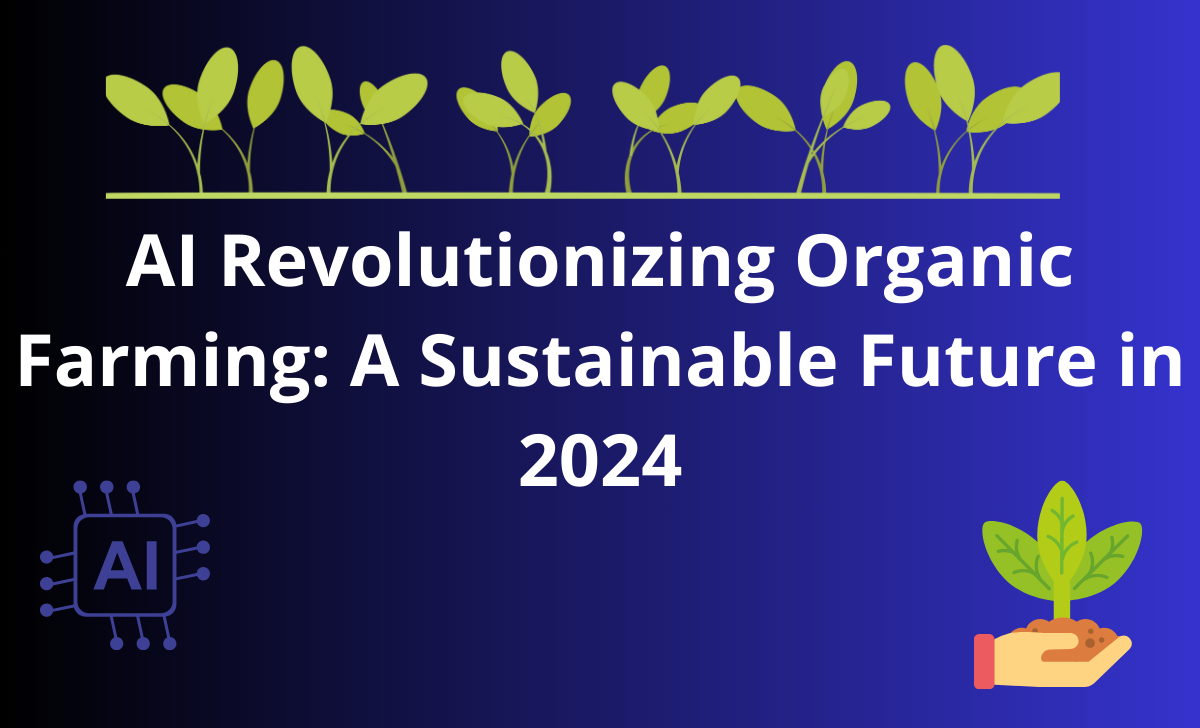|
Listen Now Our Blog Podcast
Getting your Trinity Audio player ready...
|
Introduction
In the modern world, the realm of agriculture is undergoing a profound transformation with the integration of Artificial Intelligence (AI). AI is making significant strides in various sectors, and organic farming is no exception.
Organic farming, which emphasizes environmentally friendly practices and the reduction of synthetic inputs, is gaining popularity as a sustainable alternative to conventional agriculture.
The marriage of AI and organic farming brings forth a plethora of benefits that not only optimize production but also foster ecological balance. In this blog, we delve into the remarkable ways AI is revolutionizing organic farming, paving the way for a greener and more sustainable future.
1. Precision Farming
Precision farming is one of the cornerstones of the AI-driven agricultural revolution. By incorporating AI technologies such as drones, satellites, and sensors, organic farmers can gain comprehensive insights into their fields’ condition.
mmm, AI-powered drones can monitor crop health, detect pest infestations, and evaluate soil quality, thereby enabling targeted intervention. Farmers can optimize irrigation schedules, apply organic fertilizers judiciously, and manage crop rotations more efficiently. This reduces resource wastage and minimizes the environmental impact, aligning with the core principles of organic farming.
2. Crop Health Monitoring
AI-driven systems equipped with computer vision algorithms can accurately identify and diagnose diseases, pests, and nutrient deficiencies in crops. These systems utilize images captured by drones or smartphones to detect early signs of distress in plants. By catching potential issues at their onset, organic farmers can respond promptly with organic treatments, mitigating the need for chemical interventions and ultimately leading to healthier crops and improved yields.
3. Predictive Analytics
AI’s predictive capabilities empower organic farmers to plan and strategize effectively. Through data analysis of historical weather patterns, soil health, and crop performance, AI algorithms can forecast potential challenges and opportunities. This enables farmers to make informed decisions, optimize resource allocation, and maximize productivity. The ability to predict fluctuations in weather patterns helps farmers proactively implement measures to protect their crops and conserve resources during adverse conditions.
4. Soil Health Management
Organic farming places immense importance on maintaining soil health. AI plays a pivotal role in soil health management by monitoring soil composition and analyzing its quality. Soil sensors combined with AI algorithms can assess crucial factors like nutrient content, moisture levels, and pH balance. This information empowers farmers to adjust their organic fertilization practices, prevent soil degradation, and improve soil fertility naturally over time.
5. Autonomous Farming Equipment
AI-driven autonomous farming equipment is gradually becoming a reality, and this technology is well-suited for organic farms. Autonomous tractors, robots, and harvesters can be programmed to perform precise tasks like planting, weeding, and harvesting. By minimizing human intervention, organic farmers can avoid soil compaction and reduce the risk of accidental crop damage. Furthermore, autonomous machinery can work around the clock, enhancing overall farm efficiency and productivity.
6. Efficient Water Management
Water scarcity is a global concern, and AI can help organic farmers optimize water usage. Soil moisture sensors combined with weather data and AI algorithms enable efficient irrigation scheduling. By providing crops with the right amount of water at the right time, organic farmers can minimize water wastage and conserve this precious resource, thus contributing to sustainable agriculture.
7. Biodiversity Conservation
Organic farming encourages biodiversity by promoting natural ecological balances. AI technologies assist in creating “biodiversity maps” by analyzing the distribution of flora and fauna on the farm. Farmers can identify areas with reduced biodiversity and implement measures to support beneficial insects, birds, and other organisms that contribute to pest control and pollination. This symbiotic relationship fosters a healthier ecosystem and reduces the dependence on chemical inputs, ultimately promoting sustainable agriculture practices.
8. Market Analysis and Supply Chain Optimization
AI’s data analysis capabilities extend beyond the farm itself. AI can analyze market trends, consumer preferences, and supply chain dynamics, enabling organic farmers to make informed decisions about which crops to grow and when to sell them. Additionally, AI-driven supply chain optimization can minimize food waste and ensure that organic produce reaches consumers efficiently, thus supporting the growth of organic agriculture in the market.
Conclusion
The symbiotic integration of AI and organic farming promises a more sustainable and environmentally conscious future for agriculture. From precision farming to efficient water management and biodiversity conservation, AI technologies are empowering organic farmers to optimize their practices while reducing their environmental impact. As AI continues to evolve, it will undoubtedly open up even more possibilities for sustainable agriculture, enhancing food security and safeguarding the planet for generations to come. By embracing AI in organic farming, we take a significant step forward in achieving a greener, healthier, and more resilient agricultural landscape.




